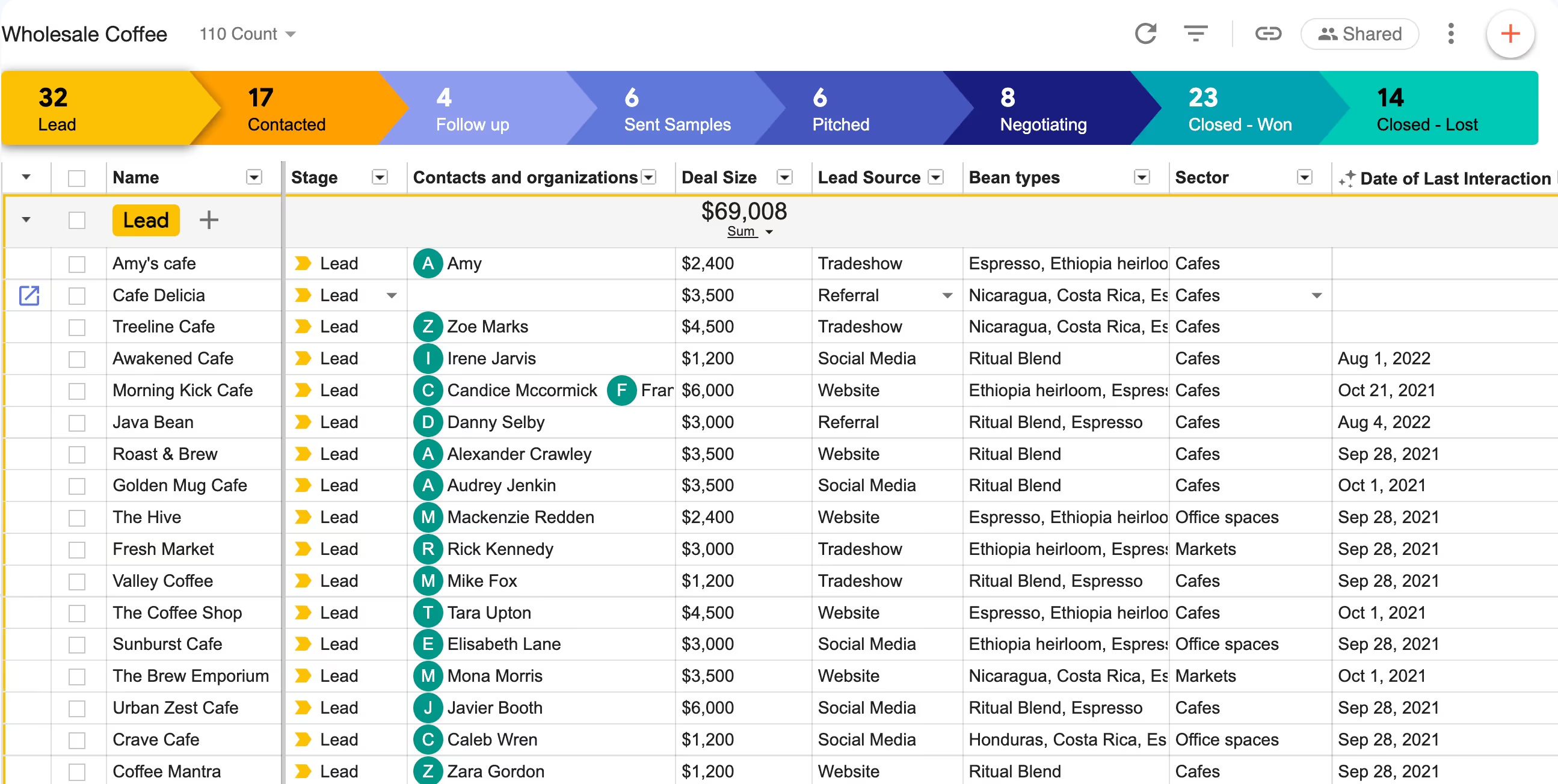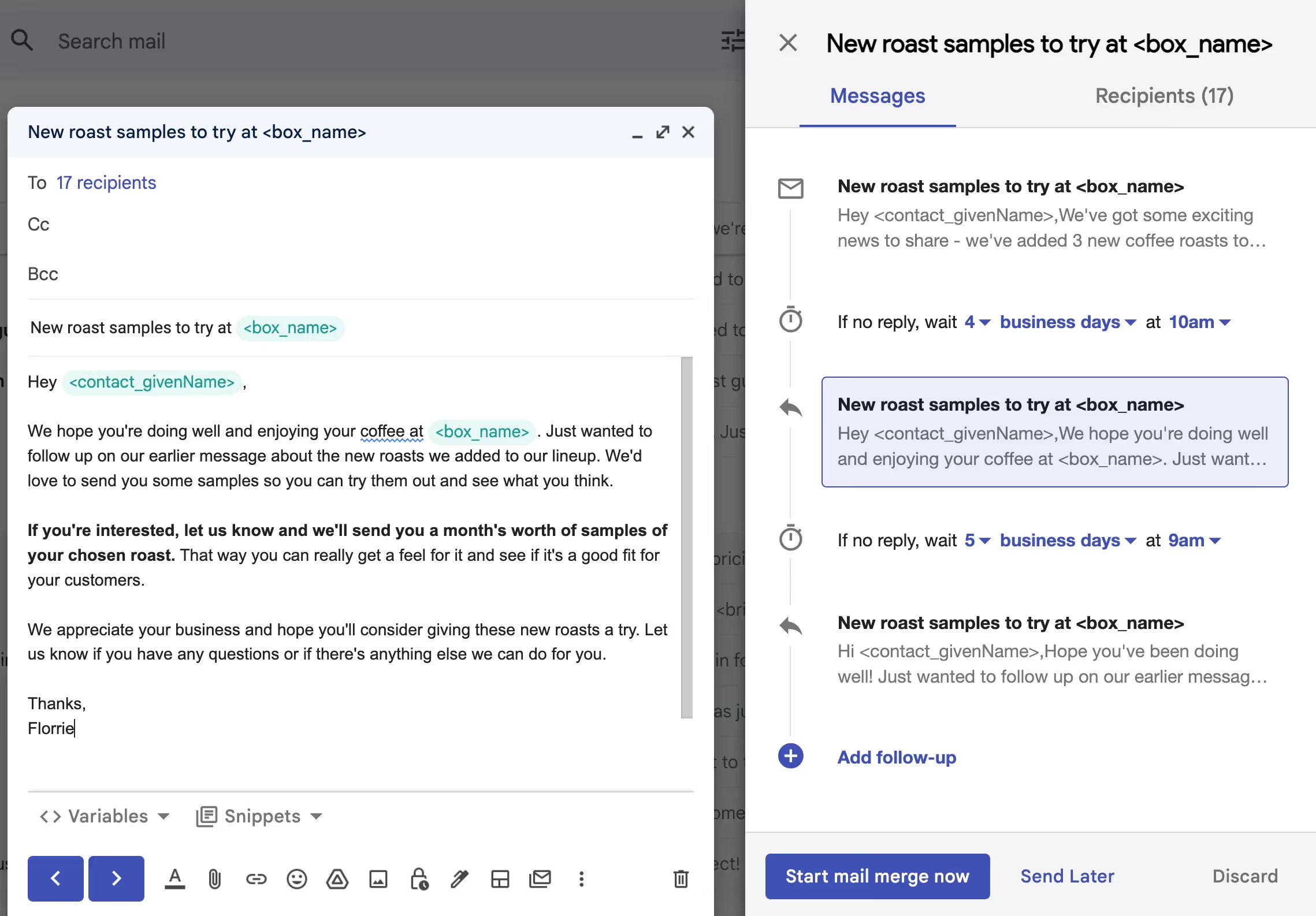Work smarter, not harder with native CRM automations and integrations in Streak
Native integrations and automations allow you to automate your CRM workflow and tasks, while integrating directly with tools like Calendly and Typeform.
On the surface, CRM and marketing software programs seem similar. Both programs help you nurture relationships with customers and automate important tasks. However, there are key differences between these two programs.
As the name implies, marketing automation focuses on optimizing your marketing strategy across a variety of channels. Alternatively, CRM focuses on optimizing your sales and customer service strategies. These tools have distinctly different features, although many organizations use both in tandem to streamline their marketing and sales funnels as well as customer relations.
Let’s take a look at CRM vs. marketing automation to see how they work, what features they provide, and which one is best for your needs.
<a href="#what-is-a-crm" class="anchor-link">What is a CRM?</a>
<a href="#what-is-marketing-automation" class="anchor-link">What is marketing automation?</a>
<a href="#which-one-do-you-need" class="anchor-link">Which one do you need?</a>
<a href="#streamline-sales-and-marketing-with-streak" class="anchor-link">Streamline sales and marketing with Streak</a>
<div class="anchor-wrapper"><div id="what-is-a-crm" class="anchor-target"></div></div>

CRM stands for customer relationship management. CRM tools are designed to manage both existing customer relations and future sales prospects. While CRMs are intended primarily for sales and customer service teams, they are also incredibly beneficial for sharing information and collaborating with team members across an organization.
CRMs offer a variety of features to automate and organize your workflow. You can keep track of contacts, organize sales records, and manage customer communication all in the same place.

These programs also make it easy to assign tasks to your team to ensure that no sales prospects are neglected. Some CRMs include features that allow you to schedule automatic email sequences for outreach and follow-up, along with other email tools.

Many CRM apps, like Streak, allow native integrations with other popular apps like Calendly, Typeform, and Slack. This allows you to pull data from forms, event bookings, social media campaigns, and other interactions to stay on top of your customer relations.
<div class="anchor-wrapper"><div id="benefits-of-using-a-crm" class="anchor-target"></div></div>
CRMs help teams manage prospects from the initial inquiry all the way to the final sale.
Tracking customer and lead data in a CRM ensures nothing slips through the cracks so you never miss a sale. They also help you maintain your relationships with existing customers to reduce churn and/or increase repeat purchases.
Since they allow you to keep track of a wide variety of customer information and preferences, they’re a key contributor to helping businesses work more effectively with existing customers. For example, you’ll be able to note whether customers prefer email, text message, or phone calls to reach them most effectively.
By creating detailed customer profiles, you can personalize your communications and build brand loyalty.
<div class="anchor-wrapper"><div id="choosing-the-right-crm" class="anchor-target"></div></div>
There are so many CRMs on the market right now, each with their own unique features. Ultimately, the best CRM is the one that you and your team actually use.
Streak is a CRM that operates directly in Gmail and allows you to manage leads and customers without leaving your inbox.
Other popular CRMs include:
When choosing a CRM, you’ll want to look for a product that integrates well with your existing workflows. It should be compatible with tools you’re already using and be easy to learn.
Depending on the type of work you do, you may want a CRM that includes industry-specific sales features. However, a customizable CRM will allow you to customize your workflows to track the specific steps in your process and keep any type of lead and customer data organized.
Before comparing CRMs, consider the problems you’re trying to solve within your workflow. For example, you may be trying to improve your:
Finally, cost is another important factor to keep in mind - you’ll want to make sure that your CRM fits into your budget and doesn’t break the bank.
<div class="anchor-wrapper"><div id="what-is-marketing-automation" class="anchor-target"></div></div>
When comparing CRMs vs. marketing automation, you’ll notice that both types of tools are customer-focused.
However, marketing automation tools focus on building strong campaigns that resonate with prospective customers higher in the funnel, rather than tracking and managing your sales pipeline. These tools also automate many of the rote tasks associated with marketing, such as sending emails, posting to social media, and calculating analytics.
Marketing automation tools allow you to manage many different marketing strategies in one place. For example, you might be able to plan an email campaign, social media campaign, and targeted pay-per-click (PPC) campaign all in one place.
Many marketing automation tools integrate with CRMs or have some CRM-like features built in as well, which allows you to connect your sales pipeline to your marketing strategy.
<div class="anchor-wrapper"><div id="benefits-of-marketing-automation" class="anchor-target"></div></div>
Marketing automation gives you the ability to see how prospects are interacting with your marketing materials and what strategies are most effective. This gives you the opportunity to fine-tune your marketing and ultimately generate higher-quality leads for your sales team. Additionally, you’ll be able to segment your audience lists and create personalized marketing strategies.
These tools are also incredibly helpful for streamlining your marketing team’s workflow. With so many tasks to take care of and platforms to manage, today’s marketing teams have a lot on their plate. Marketing automation tools make it easy to stay organized and get more done.
<div class="anchor-wrapper"><div id="choosing-the-right-marketing-automation-program" class="anchor-target"></div></div>
There are dozens of marketing automation programs available today, with options that cater to many different industries and marketing channels. Some popular marketing automation tools include:
You’ll notice that many popular CRMs have associated marketing automation programs. If you’re already using a CRM, it’s helpful to choose a marketing automation program that is compatible with it for a more streamlined workflow. Your marketing automation program should also integrate with the channels you use most, whether that’s email, social media platforms, Google Ads, or something else.
<div class="anchor-wrapper"><div id="which-one-do-you-need" class="anchor-target"></div></div>
As your business grows, you’ll need to implement tools to manage sales, marketing, and customer relationships. Managing these tasks manually is not only stressful, but it also makes it difficult for your team to grow. Some teams need CRMs, some need marketing automation, and many need both.
If you’re struggling to offer reliable customer service and communicate directly with your customers, you’ll need a CRM. If you need to expand your marketing strategy and generate new leads, a marketing automation tool will be more effective. However, you don’t necessarily have to choose between these two tools.
Many platforms offer both CRM and marketing automation features - for example, Streak offers a dedicated CRM as well as marketing automation features like email tracking and mail merge.
<div class="anchor-wrapper"><div id="streamline-sales-and-marketing-with-streak" class"anchor-target"></div></div>
If you already use Gmail to manage your customer communication and marketing efforts, Streak’s CRM will help you perform outreach and keep track of leads and customers.
Start your 14-day free trial now to explore features like sales pipelines, team collaboration, task management, and automated email sequences.
